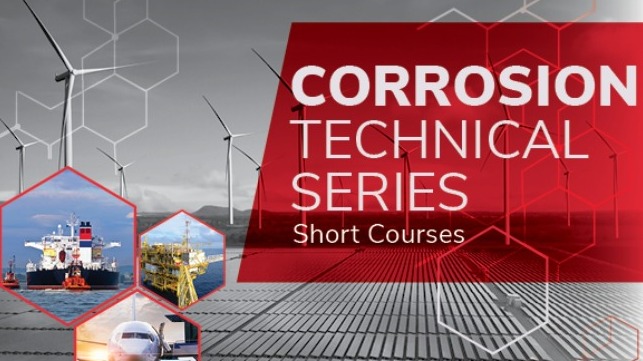Protecting Maritime Assets from Corrosion

Marine Exhaust Gas Cleaning Systems (Scrubbers) and Marine Biofouling Management are the key to combating corrosion and extending the lifespan of maritime assets
Transportation, energy production, navigation, national security—these sectors depend on safe, secure maritime resources. To address this, AMPP, the Association for Materials Protection and Performance, has developed a maritime strategy around two simple goals: to educate industry stakeholders about corrosion mitigation strategies, and to provide knowledge and technical resources to industry professionals working to protect ships, ports, offshore assets, and more from the dangerous effects of corrosion.
A 2016 study by AMPP (formerly NACE International), found that the estimated total cost of marine corrosion worldwide is between $50-80 billion every year. “Because maritime industry assets operate in or near highly corrosive environments, virtually all of those assets are susceptible to the effects of corrosion,” says AMPP’s Chief Maritime Officer Buddy Reams. “The consequence of failure to any one of these assets can mean loss of life, harm to the environment, and significant economic losses. This makes the industry a worthwhile beneficiary of AMPP’s expertise.”
AMPP offers a number of training programs and certifications related to the maritime industry, covering topics such as marine coating technologies, cathodic protection, and offshore corrosion assessment training. The organization also provides standards and reports for the maritime and offshore industries.
This year, AMPP has added two maritime-related courses to its Corrosion Technical Series, a seminar program that offers direct access to in-the-know subject matter experts. These short courses are offered in an interactive, virtual format, with knowledge checks and Q&A sessions to ensure students gain a thorough understanding of the course material. At the end, participants can earn professional development hours (PDHs) and a certificate of completion to demonstrate their understanding of the materials covered in the course.
Marine Biofouling Management
March 30-31, 2021
This virtual short course highlights the economic and environmental benefits of managing biofouling of marine assets. Seven industry thought leaders share their expertise in mitigating biofouling from their unique perspectives in shipping operations, research, environmental regulations, antifouling coatings, hull cleaning, naval architecture, and more. Their experiences contribute to a holistic body of knowledge that addresses biofouling management from initial design throughout the service life of the vessel.
Hear their insights, best practices, and current developments related to environmental regulations, in-water cleaning processes, niche area design, and selection of anti-fouling coatings. You will walk away with transferrable knowledge you can implement in your career.
Featured lecturers include:
Johnny Eliasson, Chevron Shipping, Hull & Coatings Engineer
Geoff Swain, Florida Institute of Technology, Professor of Oceanography and Ocean Engineering, Ocean Engineering and Marine Sciences
Aron Frank Sørensen, BIMCO, Head of Maritime Environment
Colin Anderson, American Chemet, R&D Director
Jong Woo Park, STX Offshore & Shipbuilding, KOSHIPA, and Active Shipbuilding Experts’ Federation (ASEF) SWG 1 Chairman
Tim Wilkins, INTERTANKO, Environment Director Regional Manager Asia-Pacific
Chris Scianni, California State Lands Commission
Corrosion in Marine Exhaust Gas Cleaning Systems (Scrubbers)
April 13 - 14, 2021
The marine industry is facing the challenge of adopting new technologies and/or operational practices to comply with stricter regulations introduced to reduce air emissions from ships. The adverse effects of exhaust gas emissions from internal combustion engines and boiler exhaust gases on human beings and sensitive ecosystems have been well documented by the scientific community. This virtual short course focuses on guidance and current discussion of materials selection and corrosion of marine exhaust gas cleaning systems (EGCS or scrubbers).
Critical amongst these regulations are the measures to reduce sulfur oxide (SOx) emissions inherent to the relatively high sulfur content of marine fuels. Ship designers, owners and operators have a number of different routes to achieve SOx regulatory compliance.
Featured lecturers include:
Bud Ross, Nickel Institute
Peter Bock, Performance Polymers Americas, LLC
John Grocki, Sandra Le Manchet & Pierre Petit ArcelorMittal
Tim Mournian, Titanium Marine Technologies, LLC
Per Bjärkby, Yara Marine
Nick Subotsch, Peerless Industrial Systems
Helena Alves & Volker Wahl, VDM Metals International GmbH
Willem Kemps & Cees van de Mast, Verolme® Special Equipment b.v
Free digital download: Learn important terminology for corrosion mitigation in the maritime industry. Download the Maritime Glossary for free: https://bit.ly/3blGUPt
This message is sponsored by the Association for Materials Protection and Performance
The opinions expressed herein are the author's and not necessarily those of The Maritime Executive.
